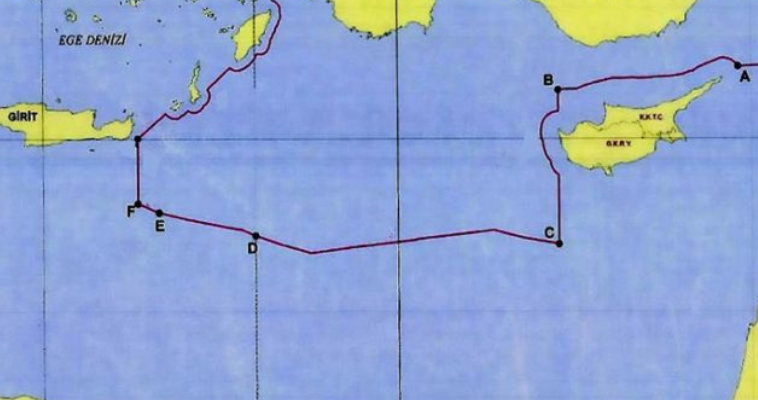Stavros Lygeros: After retrogression, Athens is on the path of an anti-Turkish alliance
15/08/2020
On February 20, 2020, I published an article with the poignant title “Storm in sight – The upcoming Greek-Turkish crisis and geopolitical ionization“, in which I wrote: “in which I wrote: “It is impressive, in fact, that Athens does not seem to have fully realized that a crisis is coming that will have an unpredictable end .” And “geopolitical ionization” is nothing more than the anti-Turkish coalition that we see gradually taking place these days
.
I should remind readers that at that time Athens was saying that the Turkish research vessel had been swept away by the winds (!) sending the wrong message to Ankara. This is evidenced by Erdogan’s statement in the following few days: “Our resolute stance in the Mediterranean has begun to be accepted, especially by Greece.” Those in Athens who exorcised the problem have repeatedly been shown to turn their desires into reality. That “stroll” of the Oruc Reis was undertaken in order to test Greek reactions. And the odd Greek statements about the weather conditions led Ankara to dangerous conclusions.
In the same article, I commented on the fact that Erdogan has opened many fronts, resulting in corresponding contradictions, and I had estimated that “geopolitical ionization can occur. “Especially if France, Egypt and Israel step forward, they will probably turn against Turkey in practical terms.” I added that from the Greek reactions so far, “Erdogan is convinced that Athens will back down (if Turkish surveys are carried out). This is what happens when Athens, through its actions, undermines the message of deterrence it sends.”
On June 7, 2020, I published an article entitled “Greek deterrence is hollow – A Mediterranean anti-Turkish alliance is possible”. The article began as follows: “The question is scorching and relentless: what will Greece do if Turkey sends a seismic research vessel just outside Greek territorial waters, but inside the Greek EEZ, as officially announced by Ankara? Will it limit itself to diplomatic reactions, or will it actually prevent the violation of Greek sovereign rights?”
In that article I argued that “the Turkish president is repeating on the Greek continental shelf, in copy paste mode, what he had already undertaken in the Cypriot EEZ. The first step was the exploratory “stroll” of “Barbaros”, in order to gauge reactions. When Turkey found out that third parties did not react and that Greece kept its distance (by offering only diplomatic assistance to Nicosia), he took the second step: systematic research in the Cypriot EEZ, again without significant reactions.
The third step was to drill on an unlicensed offshore plot at a remote point at the west end of the Cypriot EEZ. When Ankara again found out that the reactions were merely diplomatic and that the EU did not impose severe sanctions on its pirate state, it took the fourth step: it sent the drilling rig to a sea plot, the rights of which are held by the French firm Total and the Italian firm ENI“.
It was clear that no player was willing to use military means to stop the Turks. Instead, Erdogan is determined to use the military tool to advance his expansionist agenda. We saw it in northern Syria, we also saw it in Libya, where with his intervention he changed the course of the civil war.
In the June 7 article, I emphasized that “Erdogan’s determination to speak with deeds and not just with words gives him a tactical advantage. With their expansionist arbitrariness, the Turks have caused – more or less – concern and dissatisfaction in the West, Egypt and Israel … As long as the other players are stuck at the diplomatic level, because they are afraid (Greece), or because their immediate interests are not directly affected. (Israel, Egypt, USA, France), Erdogan will garner points, creating faits accomplis. Tactical victories not only give him an advantage, but also fuel his arrogance. Therefore, this shows that he does not know when to stop “.
If he continues like this, he will most likely open many fronts and fall into the trap of “over-expansion”, which is a recipe for strategic defeat. Why? Because the other players will be forced at some point, by events, to stop the “bully”. “In other words, they will be forced to use the very means used by Erdogan with very unpleasant results for his country.”
A Mediterranean anti-Turkish alliance
We will not have to wait long to see the catalyst at the political level (without underestimating the operational damage of the Turks) bombing of the Al Watiya base by “unknown” fighter aircraft. For the first time they paid the “bully” with the same currency. The road to an anti-Turkish entente has since been paved. Erdogan seeks to consolidate the “Blue Homeland”, his vision to turn the heart of the Eastern Mediterranean into a “Turkish lake”. This is not in the interests of the other Mediterranean powers.
At this point, the conditions for concluding an informal Mediterranean alliance with an anti-Turkish flavor are more mature than ever. France will de facto play a leading role with strong players under the its leadership and with the participation of Greece, Egypt and in some special relationship Israel. On the anti-Turkish front, it is a given that the Emirates and Saudi Arabia are ready to join. The conclusion of such an informal alliance would radically change the scene, thwarting Erdogan’s expansionist intentions and leading his neo-Ottoman strategy to collapse.
The task is undoubtedly very difficult, but it is worth the effort. The aforementioned bombing of the Turkish base at Al Watiya (western Libya) was a first step in the right direction, which, however, was able to prevent the announced attack on Sirte. The joint Greek-French exercise in the Turkish-occupied region of the Eastern Mediterranean (Thursday, August 13th) effectively canceled the Turkish Navtex, sending a strong message to Erdogan.
In Libya Erdogan “stepped on too many toes”
Undoubtedly, Erdogan’s move that “stepped on too many toes” was the drastic military intervention in favor of Tripoli and his threat of an attack on Sirte aimed at turning Libya into a Turkish protectorate. This operation “broke the camel’s back” in Cairo’s which already had bad (due to Muslim Brotherhood) relations with Ankara.
This also pushed Paris to enter the game in a vary poignant manner. France is unwilling to let the Turks fill the gap left by the partial withdrawal of the Americans from the region. In particular, it is not prepared to allow the transformation of the Eastern Mediterranean into a “Turkish lake”. Even Italy was unhappy with the prospect of such a development. For the same reason, it is extremely difficult to bridge the Israel-Turkey rift, at least during Netanyahu’s reign.
Note the geostrategic dynamics as I briefly outlined above, during which I have argued, for months, that Athens had a vital interest in leading the way in concluding such a Mediterranean alliance. Obviously, the success of such an initiative was not a given, but it was worth the effort. It is true that regional military alliances became old-fashioned after the war. First because of the Cold War and then because of the culture that they are obsolete.
The Greek political system is deeply immersed in this delusion. Hence, other winds were blowing in the Mitsotakis government. After the signing of the Ankara-Tripoli memorandum (November 2019), as a reaction to its exclusion from the upcoming Berlin summit on Libya, the Greek government had invited Haftar to Athens. Its move, however, had virtually no follow-up.
Athens to Cairo: Together, or each country alone?
In Athens, many people saw the civil war in Libya, as if they were Scandinavians (!). As if it was not Sarraj who, by signing the memorandum, had carried out hostile action against Greece. So the Greek side played this almost as a neutral and was certainly reluctant to get involved even indirectly in Libya. Government officials, in fact, citing the – with Turkish assistance – military recovery of Sarraj, came to publicly state that the invitation to Haftar was a wrong move!
Mitsotakis did not reach out to Sisi to ask him the crucial question: “Since we have a common enemy, will we face Turkey together, or each country by itself“. Instead, Dendias went to his counterpart Sukri to negotiate an EEZ delimitation agreement. However, since only the EEZ was on the agenda and not the conclusion of a Mediterranean alliance, it should have been expected that the Egyptians would take advantage of the pressure on Greece, to gain a larger share. That is what happened with the troublesome Cairo agreement.
Things could be very different in this demarcation, if this single issue was part of the broader context of an allied relationship. In Athens, however, there was no concept of strategy, only tactical expediencies and moves. Hence, while Mitsotakis from the beginning of his term made an opening toward France, at the critical moment he made an about face on this. According to information, Merkel had set it as one of the two conditions (the other was the beginning of Greek-Turkish negotiation) to de-escalate the first Greek-Turkish crisis.
Reacting to the Cairo Accord, Ankara canceled scheduled talks, sent the Oruc Reis south of Kastellorizo and provoked the frigate incident. Realizing the situation, the Greek Prime Minister undertook a new turn, knocking on Macron’s door again. The French president responded, resulting in the immediate conduct of a joint exercise in the disputed area. The road is now wide open …





